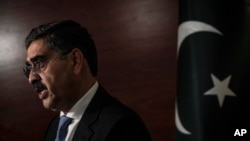Pakistan’s caretaker prime minister said he expects parliamentary elections to take place in the new year, dismissing the possibility that the country’s powerful military would manipulate the results to ensure that jailed former Prime Minister Imran Khan’s party doesn’t win.
In an interview Friday with The Associated Press, Anwaar-ul-Haq Kakar said that it’s the Election Commission that is going to conduct the vote, not the military, and that Khan appointed the commission’s chief at the time, so “why would he turn in any sense of the word against him?”
Pakistan has been in deepening political turmoil since April 2022 when Khan was removed from office following a no-confidence vote in Parliament. He was arrested in early August on corruption charges and sentenced to three years in prison, later suspended although he remains in jail. The country is also facing one of the worst economic crises in its history and recovering from last summer’s devastating floods that killed at least 1,700 people and destroyed millions of homes and farmland.
The commission announced Thursday that the elections would take place during the last week in January, delaying the vote that was to be held in November under the constitution.
Kakar resigned as a senator last month after outgoing Prime Minister Shehbaz Sharif and opposition leader Raza Riaz chose him as caretaker prime minister to oversee the elections and run the day-to-day affairs until a new government is elected.
He said that when the commission sets an exact election date, his government “will provide all the assistance, financial, security or other related requirements.”
Asked whether he would recommend judges overturn Khan’s conviction so he could run in the elections, the prime minister said he wouldn't interfere with decisions by the judiciary. He stressed that the judiciary should not be used “as a tool for any political ends.”
“We are not pursuing anyone on a personal vendetta,” Kakar said. “But yes, we will ensure that the law is appropriate. Anyone, be it Imran Khan or any other politician who violates, in terms of their political behavior, the laws of the country, then the restoration of the law has to be ensured. We cannot equate that with … political discrimination.”
He said fair elections can take place without Khan or hundreds of members of his party who are jailed because they engaged in unlawful activities, including vandalism and arson, in reference to the violence that rocked the country following Khan's initial arrest in May. He added that the thousands of people in Khan's party who didn't engage in unlawful activities “will be running the political process; they will be participating in the elections.”
The Pakistani military has been behind the rise and fall of governments, with some of Khan’s supporters suggesting that there is de facto military rule in Pakistan and that democracy is under threat.
Kakar, who reportedly has close ties to the military, said those allegations are “part and parcel of our political culture," to which he pays no attention. He called his government’s working relationship with the military “very smooth,” as well as “very open and candid.”
"We do have challenges of civil-military relationships, I’m not denying that,” he said, but there are very different reasons for the imbalance. He said he believes, after one month leading the government, that civil institutions in Pakistan have “deteriorated in terms of performance for the last many decades,” while the military is disciplined, has organizational capabilities and has improved over the past four decades.
The solution, Kakar said, is to gradually improve the performance of the civilian institutions “rather than weakening the current military organization, because that’s not going to solve any of our problems.”
Conflict in Kashmir
One major problem is Kashmir, which has been a flashpoint for India and Pakistan since the end of British colonial rule in 1947. They have fought two wars over its control.
In 2019, India’s Hindu nationalist government decided to end the Muslim-majority region’s semi-autonomy, stripping it of statehood, its separate constitution and inherited protections on land and jobs.
Kakar said India has sent 900,000 troops to Kashmir and its people are living in “a large imprisonment” with no political rights, in violation of the United Nations Charter’s right to self-determination and the resolution calling for a U.N. referendum.
While the world focuses on Ukraine, he said, Kashmir “is a crisis which primarily has a wrong geography.”
If Kashmir were in Europe or North America, would there still be what he called a “callous attitude” toward resolving it, he asked.
“The most important player in this dispute is the Kashmir people," Kakar said. “It is neither India or Pakistan” but the Kashmiri people who "have to decide about their identity" and their future.
India boasts of being the largest democracy, he said, but it "is denying the basic, democratic principle to have a plebiscite. ... So what sort of a democracy are they boasting about?”





